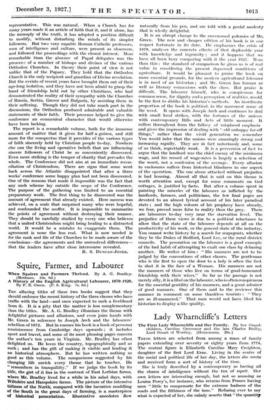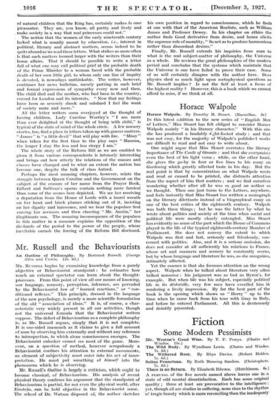Lady Wharncliffe's Letters The First Lady Wharncliffe and Her Family.
By her Grand- children, Caroline Grosvenor and the late Charles Beilby, Lord Stuart of Wortley. (Heinemann. 368.) THESE letters are selected from among a mass of family papers extending over seventy or eighty years from 1778. The central figure is Elizabeth Caroline Mary Creighton, daughter of the first Lord Erne. Living in the centre of the social and political life of her day, the letters she wrote and received form a sort of history of the time.
She is truly described by a contemporary as having all the charm of intelligence without the tax of esprit. Her own letters are interesting enough, but not so amusing as Louisa Percy's, for instance, who returns from France having seen' " little to compensate for the extreme badness of the roads and the filthiness of the inns." Refusing ever to say what is expected of her, she calmly asserts that " the quantity of natural children that the King has, certainly makes la emir pleasanter. They are, you know, all pretty and lively and . make society in a way that real princesses could not."
. The notion that the women of the early nineteenth century lacked what is usually meant by education, i.e., interest in
political, literary and abstract matters, seems indeed to be
quite absurd as we read these letters. What strikes us more often Is that such matters loomed larger with the. writers than their
home affairs. That it should be possible to write a letter _ full of what one may call political grief at the probable death of the Prime Minister to a woman faced with the probable death of her own little girl, to whom only one line of inquiry
is devoted, is nowadays unthinkable. The writer, however, continues her news bulletins, merely putting in such brief and formal expressions of sympathy every now and then.
The child died and the mother, who had been in the country, craved for London and its interests. " Now that my feelings have been so severely shook and subdued I feel the want of society more and more."
All the letter writers seem overjoyed at the thought of having children. Lady Caroline Wortley's " I am more than ever delighted at the thought of being with child," is :typical of the state of mind of the whole circle. A few nursery stories, too, find a place in letters taken up with graver matters. "James" is "a little devil" that will play with fire. "Missy" when taken for the first time to the play says " Mamma, the longer I stay the less and less sleepy I am."
The whole story of the Reform Bill as we are enabled to glean it from various correspondents is intensely interesting and brings out how utterly the relations of the masses and classes have changed and to what an extent the nation has become one, despite the talk of class hatred.
Perhaps the most amusing chapters, however, relate the struggle between Queen Caroline and the Government on the subject of the erasure of her name from the Prayer Book. Gilbert and Sullivan's operas contain nothing more farcical . than some of the scenes here depicted. We see her receiving ;a deputation from the House of Lords with a laurel wreath on her head and black plumes sticking out of it, insisting on her dignity and innocence, and we hear the populace first cursing her accusers and then cheering " Mr. Austin," her illegitimate son. The amazing inconsequence of the populace in this matter in a measure explains the opposition of the die-hards of the period to the power of the people, whose inevitable onrush the forcing of the Reform Bill disclosed.











































































 Previous page
Previous page